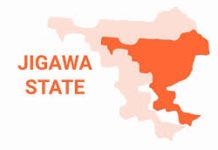The FCT Minister of State, Dr. Mariya Mahmoud, has revealed that the successful implementation of the Special Agro-industrial Processing Zones (SAPZ) in the nation’s capital would target at empowering approximately 50,000 direct and indirect jobs, with a significant focus on women, who will constitute 40% of the beneficiaries.
The minister made this revelation at the flag off ceremony for the distribution of agricultural inputs to FCT Special Agro-industrial Processing Zones project beneficiaries aimed at transforming the agricultural landscape of the Federal Capital Territory.
Mahmoud, who identified food as the most essential need for human survival, noted that agriculture plays a vital role in meeting human need.
Represented by the Mandate Secretary, Agriculture and Rural Development Secretariat, Hon. Lawan Kolo Geidam, the minister also noted that agriculture remains the backbone of the economy, providing livelihoods for millions of people and ensuring food security for the nation.
Mahmoud, however, observed that farmers and agro-industrial entrepreneurs face numerous and complex challenges, ranging from climate change, poor agricultural practices, and access to market, stressing that these challenges require innovative solutions and collaborative efforts.
“It is for these reasons that the FCT Administration has fully embraced the Special Agro-Industrial Processing Zones (SAPZ) Project, an initiative that is in tune with President Bola Ahmed Tinubu’s “Renewed Hope Agenda” predicated on injecting the much-needed manpower, resources and investments to reinvigorate the agricultural sector for sustainable development.
“We are optimistic that the agricultural inputs being distributed today, comprising Bull Calves, Animal Feeds, Crop Seeds, Fertilizers, and Crop Protection Chemicals and Equipment, will serve as a vital catalyst for building a more resilient and sustainable agricultural sector,” she added.
She, therefore, reaffirmed the FCT Administration’s unwavering commitment to supporting the successful implementation of the SAPZ project, adding that over its 5-year duration, this project targets at empowering approximately 50,000 direct and indirect beneficiaries.
According to her, “it is truly gladdening to see that among the beneficiaries gathered here today are some of the 5,000 crop and livestock farmers who have been successfully profiled and cleared under the first phase of the SAPZ intervention”.
The minister used the occasion to thank President Bola Ahmed Tinubu, for the creation of the Ministry of Livestock Development, aimed at the development of the sector which had been neglected for long.
While welcoming guests to the occasion, the Mandate Secretary Agriculture and Rural Development Secretariat, Hon. Lawan Kolo Geidam, noted that the SAPZ is an initiative that seeks to unlock the immense potential of the livestock sub-sector in the Federal Capital Territory by providing critical financing and support to drive the growth, productivity, and sustainability of the sector.
The Mandate Secretary who was represented by the Permanent Secretary Agriculture and Rural Development Secretariat, Mrs. Grace Adayilo, stated that two years into this project, the administration has made significant strides not only in an operational hub at the Paikon-Kore grazing reserve here in Gwagwalada, but also seeing substantial impacts with the construction of value addition projects.
He also noted that, beyond the training provided to various groups, the project would also provide funding for the operations of the groups in their respective vocations which is expected to reduce high cost of production, thereby enabling them to maximize earnings and improve their livelihood.
Presenting the overview of the FCT Special Agro-Industrial Processing Zone Project, the Project Coordinator, FCT SAPZ, Hajia Umma Abubakar, stressed that the Special Agro-Industrial Processing Zone (SAPZ) Project is a flagship initiative designed to revolutionize agriculture in Nigeria.
She further noted that the project was designed to promote livestock value chain and concentrate industrial processing and marketing of Beef and Dairy.
“In addition, it is aimed developing the rural areas, increasing household income, foster job creation in rural agricultural communities especially for the youth and women, enhancing food and nutrition security in FCT,” she affirmed.














































